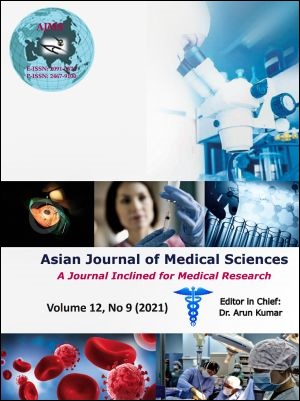Is menopause a potential risk factor for severity of COVID-19: A retrospective cross-sectional study?
Keywords:
Covid-19, Menopause, D-dimer, C-Reactive Protein, ImmunityAbstract
Background: The world is struggling with the rising number of covid-19 cases. Few studies are available to propose the effect of menopause on covid-19. We are submitting a research article targeted at identifying menopause as an independent risk factor for severe Covid-19.
Aims and Objectives: Determine whether menopausal women are at higher risk of developing severe Covid-19 infection as compared to menstruating women of the same age group.
Materials and Methods: A retrospective cross-sectional study that included patients ages varies from 40 to 55 years from the medical record department of LNMC Bhopal, India. We enrolled 65 female patients after analysing records of 2500 patients. We divided the entire study population into two groups, the menopause group, and the non-menopausal group.
Result: Out of 65 patients, 27 patients were in the menopause group, and 38 patients were in the non-menopause group. The mean D-dimer in the menopause group is 1100.78 ng/ml and in the non-menopause group is 727.63 ng/ml, which is statistically significant. (p-value 0.04) The mean value of C-Reactive protein is 27.11 mg/l and 16.74 mg/l among the menopause and non-menopause groups, respectively (p-value0.041). Twelve out of 17 patients who develop moderate-to-severe disease belong to the menopause group and five patients in the non-menopause group (p-value 0.005).
Conclusion: In the present study, we witnessed that the disease is more severe in the menopause group than in the non-menopause group (p<0.005). This study can help recognize the high-risk cases and may be helpful to plan the treatment policies for the menopausal women who contract the Covid-19.
Downloads
Downloads
Published
How to Cite
Issue
Section
License
Copyright (c) 2021 Asian Journal of Medical Sciences

This work is licensed under a Creative Commons Attribution-NonCommercial 4.0 International License.
Authors who publish with this journal agree to the following terms:
- The journal holds copyright and publishes the work under a Creative Commons CC-BY-NC license that permits use, distribution and reprduction in any medium, provided the original work is properly cited and is not used for commercial purposes. The journal should be recognised as the original publisher of this work.
- Authors are able to enter into separate, additional contractual arrangements for the non-exclusive distribution of the journal's published version of the work (e.g., post it to an institutional repository or publish it in a book), with an acknowledgement of its initial publication in this journal.
- Authors are permitted and encouraged to post their work online (e.g., in institutional repositories or on their website) prior to and during the submission process, as it can lead to productive exchanges, as well as earlier and greater citation of published work (See The Effect of Open Access).




